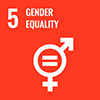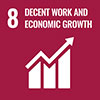Telework and conciliation: a trap for women?
The health emergency caused by COVID-19 has reopened, with particular vigour, the debate surrounding the impact of teleworking on working conditions, as well as on the possibilities it offers for conciliation. Given the high level of telework among women, it is necessary to reflect on the impact that the use of this mode of productive work may have on them and on other aspects of daily life. The extent of teleworking implies a threat to women in the sense that teleworking can have a particularly negative impact on women’s work, and this, in turn, would put at risk the progress made during the last few years in the area of gender equality. The regulation of telework is necessary to prevent it from turning into a trap that places the burden of conciliation on women.
ODS



 Anna Sánchez-Aragón
Anna Sánchez-AragónJournalism graduate from the Rovira i Virgili University with a master’s in Gender Studies and Equality Politics Management from the University of Lleida. Currently a doctoral student on the Humanistic Studies programme at the URV and a member of the research group Social & Business Research Laboratory. Her main lines of research concern gender equality and social mentorship.
 Ángel Belzunegui-Eraso
Ángel Belzunegui-ErasoProfessor of Sociology at the Rovira i Virgili University and director of the Social Inclusion professorship. With a doctorate in Sociology from the Autonomous University of Barcelona and postgraduate degree in Demography from the Centre of Demographic Studies at the same university, he specialized in the sociology of social change and research methodology. He has coordinated research projects on life conditions, social inclusion and exclusion processes of vulnerable groups, and poverty. He has participated as a researcher with the team that produced the Foessa Report 2014. He was the coordinator of the Jean Monnet module from 2017 to 2020 on EU poverty reduction policies, as well as of various projects for the R&D National Plan. He is part of the committee on publications from the Centro de Investigaciones Sociológicas (CIS) and evaluates various indexed and international magazines.
 Amaya Erro-Garcés
Amaya Erro-GarcésProfessor at the Public University of Navarre (UPNA) and tutor at the Pamplona branch of the UNED. Has a doctorate from the UPNA and is a member of the Institute for Advanced Research in Business and Economics (INARBE). Her research interests are focused on the fields of digitalization, telework, incentives, and research-action. She is a board member with the Committee for Organization and Systems of the Spanish Accounting and Business Administration Association (AECA). She has authored books and articles published in prestigious magazines. She was General Manager of the Navarre Chamber of Commerce and Industry.
 Inma Pastor-Gosálbez
Inma Pastor-GosálbezProfessor in the Department of History and Art History at the Rovira i Virgili University with a doctorate in Sociology from the Autonomous University of Barcelona (2005). Currently director of the consolidated group Social and Business Research Laboratory at the Rovira i Virgili University. Among other projects, she has directed the Jean Monnet module on European and Gender Integration and the Jean Monnet G-NET Equality Training Network. She won the award for best doctoral thesis from the Economic and Social Council of the Government of Spain, and the award from the URV University council for Social Impact of Research 2018.



